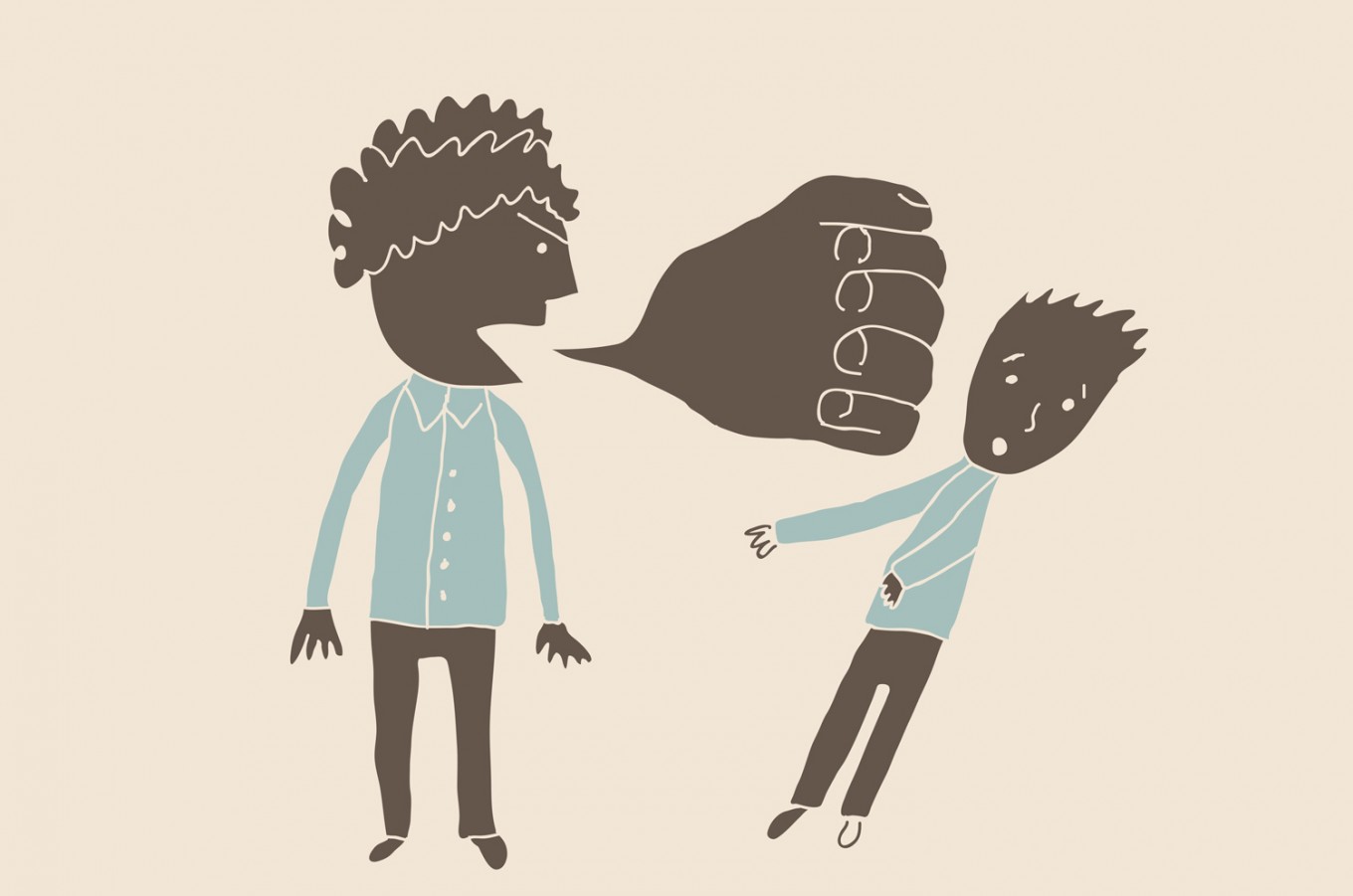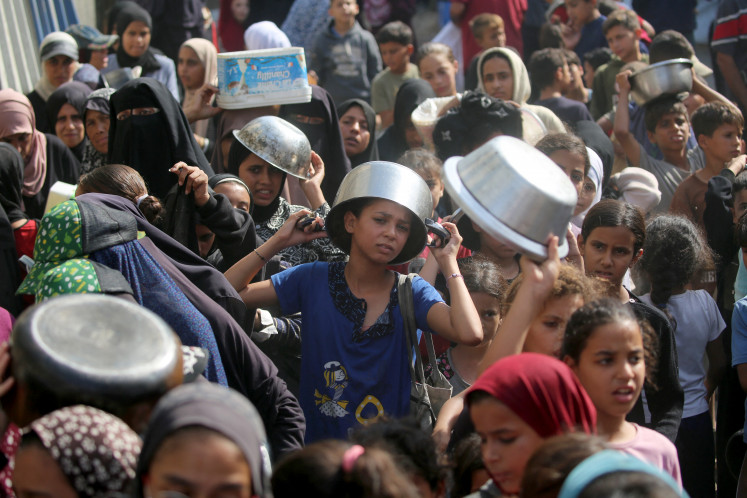Popular Reads
Top Results
Can't find what you're looking for?
View all search resultsPopular Reads
Top Results
Can't find what you're looking for?
View all search resultsWhy verbal harassment is more menacing than physical bullying
A bully at school. What’s the first image that comes to mind? My guess is a boy, bigger than the other kids, maybe not so bright, a constant chip on his shoulder. They always get into fights. But there is another more prevalent and less evident type of bully in our midst. The verbal bully.
Change text size
Gift Premium Articles
to Anyone
A
bully at school. What’s the first image that comes to mind? My guess is a boy, bigger than the other kids, maybe not so bright, a constant chip on his shoulder. They always get into fights.
But there is another more prevalent and less evident type of bully in our midst. The verbal bully.
Using just words, they cut, hurt, demean, overpower, dominate and destroy the feelings of those around them.
The physical bullies, no doubt, must be dealt with. We can’t have violence at our schools. While violence is intolerable, once a punch is thrown the teachers and adults as well as the kids know a big problem is at hand. Taking action is almost automatic. This is just a fraction of the problem.
The verbal bully can slip by, softly stating their insults and demeaning comments under the radar.
Only the victim can hear. And everyone — the bully, the victim, the adults — all think “it’s just words”. But, you know, you’ve been there, we’ve all been there — words hurt. They knock us down. They define us. One offhanded remark by a stranger can linger in our ears for the rest of the day. And we’re adults who can logically tell ourselves: “It’s just a stranger’s opinion — it doesn’t matter.”
Imagine the pain kids feel when they hear these things, without life experience to temper it.
Some verbal bullies don’t even know they are being bullies. On the one hand, they’ve been told by adults that honesty is important. So when they criticize others, they justify it as honesty. They are told to help others, so when they point out others’ weaknesses, they justify it by thinking they are being helpful.
But the core reason these verbal bullies do it over and over is the same reason the physical bullies do it again and again — they find gratification in overpowering another person. They can see that their words hurt, that they feel superior to their classmates from making a simple comment. If they are ever called on it, the excuses fly: “I didn’t mean to hurt their feelings. I was just being honest.”
The verbal bully can slip by, softly stating their insults and demeaning comments under the radar.
We live in a society of free speech. Which makes us, as adults, hesitate to punish mere words — but with free speech comes responsibility. Imagine as an adult you hear kids talking about something innocent like backpacks. “You have a Doraemon backpack? That’s weird. Doraemon looks stupid.”
The kid with the Doraemon backpack isn’t crying, but just standing there, dazed and speechless. They’ve been hurt, a small punch to their ego. Is that punishable? If you punished the bully, what would you say to the parents who ask you: “You punished my kid because he didn’t like another kid’s backpack? Are you kidding? Why don’t you tell the other kid to toughen up?”
So what do we do?
There is a time and place for different kinds of speech. Teach them positive speech, using: “If you can’t say something nice, don’t say anything at all.” You can always say something nice. Even if you don’t like something in general, look for something good to say. Don’t like the Doraemon backpack? How about the color, the extra pocket, the cool zipper? Something about that backpack has got to be good.
Challenge your kids to go a full day with only positive words. No complaining. And to come up with one compliment for each of their friends. One tiny thing. “Nice shoes” or “Good job on that project.”
Kids imitate adults. So when they see adults correcting kids, they feel the need to be helpful and correct kids around them. We can all imagine how this could be extremely positive to have kids honestly helping each other. But you can also see how one kid “helping” another could be an act of dominance and belittling.
We must teach them the proper way to help, the proper time to help, that some people don’t want help, and may not need help. Maybe they just need a little more time and space to get it done. Just because someone doesn’t do something as well as you, as fast as you, or exactly like you think it is supposed to be, it doesn’t mean they need help. Maybe they just need congratulations for doing it their own way.
Kids imitate teasing. They see adults tease each other and think that is the way to be friends. I was mortified when a teacher sent me an email about my kindergartner who made fun of a girl’s malformed hand by calling her an alien. I don’t think he had any ill will toward her, but was being honest and having fun. We had a productive chat about others’ feelings. And I reminded him of the time another kid made fun of his teeth, calling him a vampire.
Have you ever asked your kids “How was your day?” and had them reply “Good”? When you really want to have a real conversation, this is a chance to talk. Here’s a conversation starter: “I was thinking about when I was in third grade, there was a girl who always said mean things to me about what I wore. It really hurt my feelings, but I didn’t feel like I could do anything about it. Is there anything like that going on at school?”
Now your child has something to build on. “How was your day?” doesn’t really provide that. Maybe it’s not about them, but something they overheard.
Also note that it might be your kid who is the verbal bully although they and you don’t even know it. Think that’s not possible? Think of the bullies out there whose parents think they are angels.
Always remember that conversations with your kids are two-way. We adults think we know it all and don’t need to listen. But listening tells us what the child is understanding, what they are fearing, what bores them, what excites them. Listening can guide us with proper examples kids can relate to.
Eventually, if you listen, if you watch, you will recognize that spark within your child that means their whole perception and understanding of an issue has changed forever.
***
Erita Mann is a proud mom of two children. She was born and grew up in Jakarta and moved to Los Angeles in 2003. In her spare time while her children are at school, she enjoys sewing and she has a clothing store at Etsy.
Your Opinion Matters
Share your experiences, suggestions, and any issues you've encountered on The Jakarta Post. We're here to listen.
Thank you
Thank you for sharing your thoughts. We appreciate your feedback.











